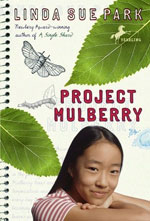 When Julia and her friend Patrick team up on a state fair project, Julia is disappointed that the silkworm project is too Korean. She wants to do something more American.
When Julia and her friend Patrick team up on a state fair project, Julia is disappointed that the silkworm project is too Korean. She wants to do something more American.
Project Mulberry by Linda Sue Park (author of A Long Walk to Water) is a simple story that touches on race and identity, but doesn’t drown in them. It’s an internal debate for Julia, but it doesn’t overwhelm the story. It’s actually refreshing to see her struggle with difficult questions, ask some awkward questions, and move on. It’s not one of these depressing novels about the horrors of institutional racism. It’s about everyday struggles, everyday problems.
That makes it a lot more relatable.
What’s weird about Project Mulberry is the between-chapter dialogues between Julia and Linda Sue Park, the author. The character and the author actually have a conversation. They talk about how the story is going, what Julia likes and doesn’t like, etc.
It’s a fun concept and an interesting way to teach kids about the writing process. But I’m not sure if it works. I felt kind of ambivalent about it, and it seems if something like that is going to work it really needs to be a positive addition to the book.
